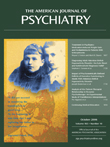Antisocial Personality Disorder as a Confounder in PTSD and Substance Use Disorders
To the Editor: We noted that although Katherine L. Mills, Ph.D, and colleagues (1) screened for individual personality disorders, these personality disorders were analyzed as a homogeneous group. Furthermore, antisocial personality disorder was absent.
We feel that antisocial personality disorder could be a confounding factor in this study. It is associated with substance use disorders (2 , 3) and is also a risk factor for exposure to traumatic events (4) .
The authors concluded that individuals with substance use disorders plus posttraumatic stress disorder (PTSD) were young, unmarried, not in a relationship, and receiving government allowances. These findings could be explained by the presence of antisocial personality disorder.
1. Mills KL, Teeson M, Ross J, Peters L: Trauma, PTSD, and substance use disorders: findings from the Australian National Survey of Mental Health and Well-Being. Am J Psychiatry 2006; 163:651–658Google Scholar
2. Hessleback MN: Childhood behaviour problems and adult antisocial personality in alcoholism, in Psychopathology and Addictive Disorders, Meyer RE (ed.). New York, Guilford Press, 1986, pp 78-94Google Scholar
3. Kessler RC, Nelson CB, McGonagle KA, Edlund MJ, Frank RG, Leaf PJ: The epidemiology of co-occuring addictive and mental disorders: implications for prevention and service utilisation. Am J Orthopsychiatry 1996; 66:17–31Google Scholar
4. Jang KL, Stein MB, Taylor S, Asmundson GJ, Livesley WJ: Exposure to traumatic events and experiences: aetiological relationships with personality function. Psychiatry Res 2003; 120:61–69Google Scholar



